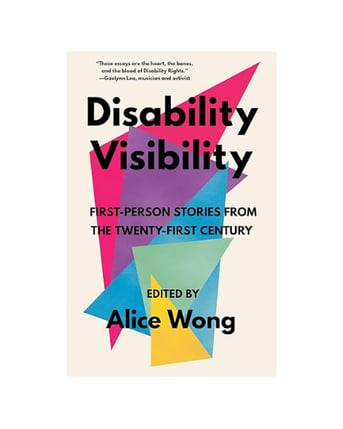"Disability Visibility: First-Person Stories from the Twenty-First Century"
"Disability Visibility: First-Person Stories from the Twenty-First Century," curated by Alice Wong,
RECOMMENDED
11/11/20242 min read


"Disability Visibility: First-Person Stories from the Twenty-First Century" is a compelling anthology curated by Alice Wong, offering readers a glimpse into the diverse experiences of individuals with disabilities. The book's title says it all: these are first-person narratives that provide an unfiltered look into the lives of people navigating the world with various disabilities. This anthology is more than just a collection of stories; it's a powerful testament to the resilience, creativity, and strength of the disability community.
The book features essays from 37 contributors, each bringing a unique perspective and voice to the table. These stories cover a wide range of topics, from the challenges of living with chronic illness to the triumphs of advocating for disability rights. The contributors come from diverse backgrounds, including different races, genders, and sexual orientations, ensuring that the anthology reflects the multifaceted nature of the disability experience.
One of the standout essays in the collection is “Unspeakable Conversations” by Harriet McBryde Johnson, which details her debate with philosopher Peter Singer on the ethics of euthanasia for disabled infants. Johnson's essay is a powerful and thought-provoking piece that challenges readers to reconsider their assumptions about disability and the value of human life. Her eloquence and passion shine through, making it one of the most memorable pieces in the anthology.
Another notable essay is “Canfei to Canji: The Freedom of Being Loud” by Sandy Ho. In this piece, Ho reflects on her journey as a disabled activist and the importance of being visible and vocal about disability rights. Her story is a reminder that activism can take many forms, and that each voice in the disability community is vital in the fight for equality and justice.
What makes "Disability Visibility" particularly impactful is its emphasis on intersectionality. The contributors' stories highlight how various aspects of identity, such as race, gender, and sexuality, intersect with disability. This intersectional approach ensures that the anthology is not just a collection of disability stories, but a broader commentary on how societal structures and prejudices impact individuals in complex and often overlapping ways.
Alice Wong's curation is masterful, as she not only brings together a diverse group of voices but also provides context and commentary that enhance the reader's understanding of the disability experience. Her introduction sets the tone for the anthology, emphasizing the importance of visibility and the power of storytelling in creating social change. Wong's own experiences and insights, shared throughout the book, add a personal touch that makes the anthology even more compelling.
"Disability Visibility" is a must-read for anyone interested in disability rights, social justice, and human stories. It challenges readers to think critically about their own perceptions of disability and to consider how they can contribute to a more inclusive and equitable society. The essays are moving, enlightening, and often provocative, leaving a lasting impact on anyone who reads them.
In conclusion, "Disability Visibility: First-Person Stories from the Twenty-First Century" is a groundbreaking anthology that amplifies the voices of disabled individuals and highlights the diversity of the disability experience. Through its powerful first-person narratives, the book offers readers a chance to learn, reflect, and grow, making it an essential addition to any bookshelf.
InclusiveWorld.Blog
Breaking Barriers, Building Bridges
Contact us:
© 2024. All rights reserved.
Follow us
